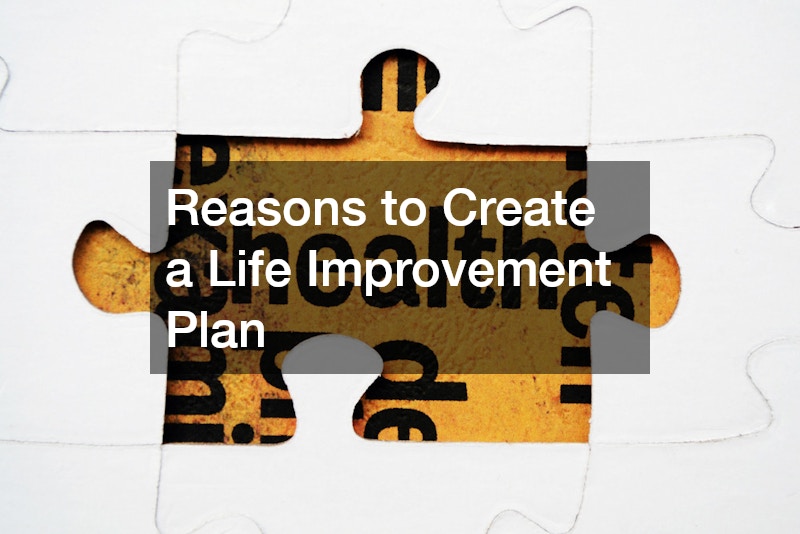How to Build a Life Improvement Plan for Better Health and Well-Being

In today’s fast-paced world, managing one’s health and well-being has never been more crucial. With increasing stress levels, sedentary lifestyles, and an overload of information, it can be overwhelming to figure out how to prioritize our health. This is where a life improvement plan becomes essential; it serves as a roadmap for enhancing your physical, mental, and emotional well-being. In this comprehensive article, we will delve into how to create a structured life change plan tailored to your needs, explaining the importance of various components along the way.
Your life improvement plan should encompass actionable steps you can take across several dimensions of your health. From physical fitness to mental health, understanding the pathways that lead to well-being can transform your approach to health. Additionally, we will touch upon specific health services and professionals, like local chiropractors, endocrinologists, and counseling services, which can offer critical support in your journey towards better health.
Another key aspect of a successful life change plan is recognizing the importance of consistency and sustainability. Making drastic changes overnight can be overwhelming and difficult to maintain, which is why gradual, realistic adjustments are more effective in the long run. Whether it’s adopting healthier eating habits, integrating mindfulness practices, or setting aside time for regular physical activity, small, intentional steps will help you build lasting habits. By focusing on progress rather than perfection, you can create a plan that aligns with your lifestyle and remains adaptable as your needs evolve.
Moreover, fostering a strong support system plays a crucial role in achieving lasting well-being. Surrounding yourself with encouraging friends, family members, or professional mentors can provide motivation and accountability as you work toward your goals. Engaging in community activities, joining support groups, or seeking professional guidance can help you stay committed to your plan. With the right resources and a well-structured strategy, you can take charge of your health and well-being, ensuring a more fulfilling and balanced life.

Reasons to Create a Life Improvement Plan
A life change plan is a personalized approach that allows individuals to set clear, tangible goals regarding their health and well-being. This plan empowers you to identify areas of improvement and engage with services that can facilitate the desired changes. Establishing such a plan not only provides structure but also motivates you to commit to your health journey.
By developing a life change plan, you prioritize various sectors of your health, including physical fitness, mental well-being, and social connections. The plan encourages a holistic view of health by incorporating multiple elements, such as nutrition, exercise, and emotional support systems. Furthermore, it aids you in recognizing and addressing obstacles that may hinder your journey towards well-being.
Additionally, a life change plan can help track your progress over time, allowing for adjustments based on what works best for you. Regularly revisiting your plan ensures that your goals remain aligned with your evolving life circumstances. As you establish milestones, you can celebrate small wins that contribute to your overall quality of life.
Creating a life improvement plan also fosters a sense of accountability and self-discipline, which are essential for long-term success. When you document your goals and the steps needed to achieve them, you create a clear roadmap that keeps you focused and motivated. This structured approach minimizes the likelihood of falling back into unhealthy habits and helps you stay committed even when challenges arise. By taking ownership of your health and well-being, you cultivate a proactive mindset that empowers you to make informed decisions and embrace positive changes with confidence.
Components of an Effective Life Improvement Plan
To create an effective life change plan, it is essential to focus on key components such as physical health, mental health, social connections, and professional guidance. Each of these areas plays a vital role in maintaining a balanced life. Addressing these components holistically maximizes the chances of achieving better health and overall well-being.
In terms of physical health, engaging in regular exercise, consuming a balanced diet, and attending routine medical check-ups are integral to your success. For instance, consulting with local chiropractors can aid in corrective measures for posture-related issues, while an endocrinologist can assist those facing hormonal imbalances. Prioritizing these health services facilitates timely interventions, ensuring optimal physical health.
Mental health is equally important, making counseling services crucial to your life change plan. Mental well-being influences every aspect of life, from emotional resilience to stress management. Incorporating resources like therapy and community support groups can provide a robust foundation for managing challenges effectively.

Goals of a Life Improvement Plan
When constructing your life change plan, setting realistic and achievable goals is critical. The SMART (Specific, Measurable, Achievable, Relevant, Time-bound) framework is an excellent tool for developing these objectives. Consider what specific changes you want to make, whether that be starting adult swim lessons or seeking consultations with a cosmetic dentist.
For example, if your goal is to reduce body fat through methods like abdominal liposuction, start with small, manageable objectives such as engaging in regular physical activity and improving dietary choices. Additionally, having a time frame for these milestones can help solidify your commitment. Tracking your progress will provide motivation and ensure that you stay on the right path.
Do not hesitate to adjust your goals as you progress. It’s important to remember that everyone’s journey is unique, and what works for one person may not work for another. Be patient and give yourself grace as you navigate the changes in your life change plan.
Role of Nutrition and Diet
Nutrition serves as the foundation for physical health, and planning your diet is a significant element of your life improvement plan. Aim to incorporate a variety of fruits, vegetables, whole grains, lean proteins, and healthy fats into your meals. Preparing meals at home can help you control ingredients and portions, paving the way for healthier eating habits.
Understanding the importance of hydration is also key. Drinking enough water affects your metabolism, energy levels, and skin health. Consider carrying a water bottle throughout the day to remind you to stay hydrated— this simple yet effective step can make a big difference in your overall health.
For those dealing with specific health conditions, consulting with professionals like an endocrinologist can guide dietary choices tailored to your unique needs. Regular check-ups can help ensure that any dietary changes align with your health goals, ultimately enhancing your life improvement plan.

Role of Exercise and Physical Activity
Incorporating regular exercise into your life change plan is essential for better health and well-being. Aim for a combination of cardiovascular activities, strength training, and flexibility exercises to improve overall fitness. Adult swim lessons, for instance, provide an excellent opportunity to increase cardiovascular health while also being a fun and enjoyable activity.
Establishing a workout routine can aid in creating consistency, which is crucial for long-term success. Find activities that you enjoy, whether it’s joining a local gym, participating in group classes, or hiking with friends. Incorporating a variety of exercises keeps things interesting and helps to avoid burnout.
Finally, remember to listen to your body. If you feel any pain or discomfort, don’t hesitate to consult with a local chiropractor or fitness professional. They can provide valuable insights and adjustments to care for your body while ensuring that your physical activity aligns with your life improvement plan.
Role of Healthcare and Routine Check-ups
Regular visits to healthcare professionals are a fundamental aspect of a life change plan. Schedule routine check-ups with your primary care physician and other specialists as needed, such as an endocrinologist for hormonal testing or a cosmetic dentist for oral health. Proactive healthcare plays a critical role in identifying potential health issues before they develop into serious problems. For instance, hormone replacement service can play a role in preventing symptoms that could damage your health in the long-term.
Utilizing diagnostic tools like an open MRI scanner can aid in the early detection of health concerns, offering peace of mind and clarity. These diagnostic measures, combined with routine consultations, support long-term health and well-being goals outlined in your plan. Don’t forget to ask your healthcare providers questions about your health, as becoming informed can help you make better decisions.
Incorporating mental health assessments into your routine healthcare visits is also essential. You might consider exploring counseling services for emotional support and guidance, which will complement your physical health initiatives. This comprehensive approach ensures a well-rounded perspective on your health journey.

Role of Mental Health
Mental health is a vital part of the overall health landscape, often impacting how we think, feel, and act. It shapes our relationships, decision-making processes, and even our physical health. A life change plan should recognize the importance of mental wellness and include strategies to promote it.
It’s crucial to create a supportive environment where mental health conversations can occur openly, whether within your family or community. Engaging with a church for young families can provide a sense of community and emotional support, helping to cultivate positive mental health outcomes. Building connections with like-minded individuals fosters a sense of belonging, beneficial to your mental well-being.
Additionally, exploring techniques like mindfulness, meditation, and journaling can further enhance your mental health. Implementing these practices can reduce stress levels and promote a positive outlook on life, assisting you in achieving your life change plan goals. Understanding that seeking help is a sign of strength rather than weakness can also change the way you view mental health support.
Role of Counseling
Utilizing a counseling service as part of your life improvement plan can enhance emotional health and provide tools for managing life’s challenges. Professional counselors offer invaluable resources for personal growth, coping strategies, and conflict resolution. Engaging with a therapist allows for a deeper understanding of your feelings and experiences, providing a safe space for exploration and healing.
Those who might struggle with anxiety, depression, or life transitions can find immense value in this aspect of a life change plan. Regular sessions can devise strategies and techniques that revitalize your enthusiasm for life. Finding the right therapist or counseling service that aligns with your approach is a significant step towards mental wellness.
Moreover, considering group therapy or support groups can facilitate a sense of community, allowing you to connect with others facing similar challenges. Sharing and listening to personal stories can foster compassion and understanding, which play essential roles in the healing process. This support network can complement your efforts in improving overall well-being.
Techniques for Stress Management
Managing stress is crucial to maintaining mental health within your life change plan. Chronic stress can lead to a myriad of health problems, so it’s crucial to identify stressors and develop coping mechanisms. Techniques such as deep breathing, yoga, and progressive muscle relaxation can be beneficial in mitigating stress levels.
Creating a balanced schedule that includes time for relaxation and self-care is also essential for reducing stress. Consider dedicating time each week for activities you enjoy, whether it’s painting, reading, or spending time with loved ones. This commitment to leisure helps combat stress and creates a more fulfilling life experience.
Additionally, maintaining a healthy lifestyle through proper nutrition and regular exercise will significantly influence your ability to handle stress effectively. When your physical health is prioritized, your mental resilience naturally improves. Embracing a holistic approach to your life change plan allows for a greater sense of overall well-being.
Role of Social Connections
Social connections play a fundamental role in emotional health. People who maintain healthy relationships often experience more joy, reduced stress, and better overall health outcomes. Building a life improvement plan that emphasizes social engagement can catalyze your journey towards well-being.
Consider joining community groups or clubs that resonate with your interests, providing opportunities to meet new people. Seek out local activities, workshops, or classes to engage in conversations and build connections, whether related to fitness, arts, or hobbies. Actively participating in your community fosters a sense of belonging and purpose.
Don’t overlook the impact of existing relationships; nurturing ties with family and friends is just as critical. Schedule regular check-ins or plan social events to strengthen these bonds. A supportive network contributes immensely to your overall happiness and emotional health.
Resources in the Community
Diverting attention to local resources opens up a myriad of opportunities for health and well-being improvements. Resources such as community wellness programs, fitness classes, or workshops focusing on diverse subjects often provide affordable and engaging ways to enhance your health. Participation in such programs elevates your life change plan beyond personal effort.
Consider resources like adult swim lessons for yourself or your family, providing not only a fun workout but also an opportunity to socialize. Engaging with community centers or local organizations can connect you with information about health services, classes, or events that focus on wellness. By being proactive, you can enrich your life change plan with valuable connections.
Furthermore, partnerships with local health professionals—whether it’s a dietitian, a local chiropractor, or a wellness coach—can enhance your life improvement plan. These experts offer insights into bettering health practices while oftentimes catering services to communal needs. Engaging actively with these professionals can lead to tailored guidance essential for elevating your quality of life.
Building a life change plan for better health and well-being is an empowering journey that requires commitment, self-awareness, and the resolution to make progressive changes. By setting realistic goals, identifying key physical and mental health strategies, and nurturing social connections, you can create a balanced approach that supports your overall well-being. Remember to be patient with yourself; real improvements take time and consistency, and there might be setbacks along the way.
Engaging with healthcare professionals, seeking out community resources, and incorporating your unique needs into your life change plan will elevate your health journey. Don’t take regular appointments for granted, such as seeing your optometrist for prescription eyeglasses. Whether you find strength in therapy, motivation through community activities, or clarity with healthcare tools like an open MRI scanner, every step taken is a movement towards a healthier lifestyle. Ultimately, your life improvement plan is about crafting a fulfilling life that supports your aspirations and enhances your day-to-day experiences.
Your well-being is a continual process, and maintaining the momentum is key. Celebrate your progress, however small, and adjust your plan as necessary. The pursuit of better health is a lifelong journey, and with your life change plan in place, you are well-equipped to navigate the path ahead.
Embracing flexibility and adaptability in your journey will ensure long-term success. Life is dynamic, and your needs, goals, and circumstances may evolve over time. Regularly reassess your plan, remain open to new approaches, and don’t hesitate to seek guidance or support when needed. By cultivating a mindset of growth and resilience, you’ll not only sustain your well-being but also continue to thrive in all aspects of life.
